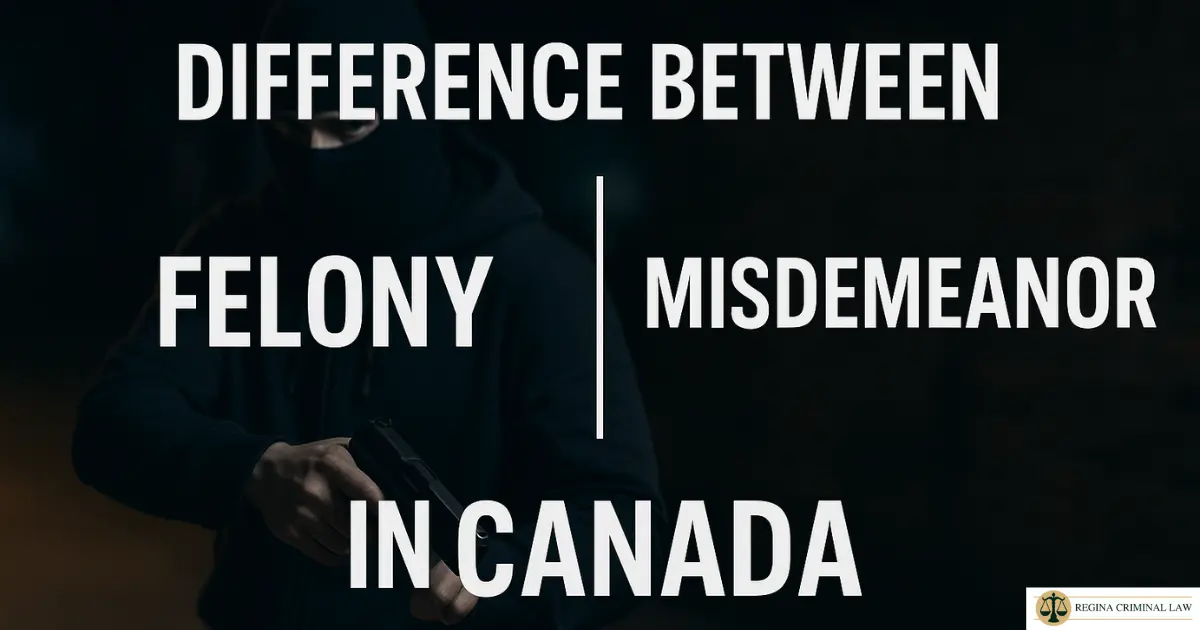When you are navigating the general legislature in Canada, it may not feel very clear for many reasons.
Certain terms, like Felony, Misdemeanor, Summary, and Indictable Offences, cross each other in context and scope. It’s only normal for you to get puzzled without making a clear sense of which terms actually mean what.
Some terms are taken from other countries’ judicial systems due to their popularity and wider recognition. When citizens come across the local alternatives for those terms, it triggers confusion. Felony vs misdemeanor proves the same argument.
This article will elaborate on your knowledge of:
- What a Felony means in Canada
- What a Misdemeanor means in Canada
- What stirs the confusion
- How felony and misdemeanor are different

What is a Felony in Canada?
A felony describes a serious offence or breach that can be marked under criminal behaviour or activities as the highest forms of violation of human rights. In Canadian Law, similar activities are explained with the term “Indictable Offence”.
Criminal activities of the most vicious kinds, like murders, manslaughters, rape, assault, trafficking, and so on, are common examples. Though, for the sake of argument and understanding, a felony in the US court is often compared with an indictable offence in the Canadian court, they still share a few noticeable anomalies.
To note a few:
Highest Penalty
A felony may lead to the death penalty; an indictable doesn’t.
Ruling Court
A felony case is handled by the State or Federal court in the USA, whereas an indictable offence is discussed in the provincial or supreme court of Canada.
Employment and Immigration
A felony allegation eliminates all civil rights, including employment and immigration. An indictment offence limits such rights for 10 years in general cases.
What is a Misdemeanor in Canada?
A misdemeanor Offence describes trivial criminal activities punishable with relatively tolerable penalties if compared with a felony. The Canadian equivalent term for a misdemeanor is “Summary Offence.”
Common examples of such minor offences include petty theft, driving under the influence, vandalism, and public disturbance. Similar to serious offences, Canada appears to take a slightly different stance in treating and punishing summary offences compared to the USA jurisdiction.
Major differences include:
Highest Penalty
A misdemeanor may result in a maximum jail term of 12 months and fines. For a summary offence, the worst-case scenario may cause a maximum of 6 months of Jail time.
Proceeding
A misdemeanor, if serious, may roll across several court sessions in the USA, needing time for further investment and creating a judicial body, extending the duration of the procedure. Canadian courts don’t arrange a judicial analysis or investigation and draw a verdict as quickly as possible.
Concussions
A misdemeanor may result in serious concussions, affecting employment, residence, personal reputation, and so on. A summary offence in Canada is more lenient to the offender. It clears the charge and records after the completion and payment of jail time, probation, or fines.
What Sparks Confusion about these Terms? -Hybrid Offences
Even after having a transparent idea of these terms’ origins and the uniqueness of their legal proceedings, you may still stumble. Primarily because there is one factor that often remains unexplained when discussing criminal offences.
In the Canadian Criminal Act, a third type of offence handles some charges that often fall between the grey line of a summary charge and an indictable offence. It’s called a Hybrid offence.
Hybrid charges are special as they are neither categorized by the summary offence nor the indictable offence sections of the Criminal Act. The Crown prosecutor preserves the authority to determine the severity and the category of these charges.
When classifying the nature of a hybrid offence, the court takes certain aspects into consideration. Like:
- The severity of the action
- The gravity of the situation
- The degree of the offence
- The strength of evidence
- The amount of damage and impacts

Felony vs Misdemeanor vs Hybrid Offence in Canada: Key Differences in the legal system
A felony, or indictable offence, a misdemeanor, or summary conviction, and a hybrid offence cover the most common and special types of infringements of the Criminal Code in Canada.
Here is a table highlighting their major differences:
| Key Aspects | Summary | Indictable | Hybrid |
| Severity | Highest | Least | Depends on the Court’s judgment |
| Crown Prosecutor | Doesn’t involve | Doesn’t involve | A CP decides the nature and category of the charge |
| Jurisdiction | The Provincial Court | Both the Provincial and Superior courts may engage | Depends on the Court’s judgment |
| Judicial Body | The judge exercises the full authority | A jury board may take part in the hearing and reach a verdict | Depends on the Court’s judgment |
| Preliminary Investigation | Not required | The court allows a specific time for prior investigation and preparation | Depends on the Court’s judgment |
| Highest Penalty | Two years of imprisonment | Life-imprisonment | Depends on the Court’s judgment |
| Validity Period | A charge must be in place within 12 months of the incident | Any time an offender finds it suitable and convenient | Depends on the Court’s judgment |
| Example | Impaired driving, minor theft, break and entry | Murder, manslaughter, rape, burglary, etc. | Theft, hit with evil intention, sexual assault, and impaired driving occurred in a special scenario |
Final Verdict
Still wondering, “Does Canada have felonies?” What is a felony in Canada, as you know by now, is usually described by the term “Indictable Offence”. With several legal jargons, like a felony, misdemeanor, summary, indictable, and hybrid, that interpose each other by definition, scope, penalty, origin, and judicial practices, it’s often hard to make sense of them. But to approach these offences appropriately, you must be aware of their differences.

